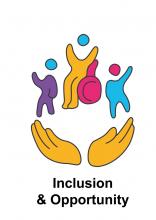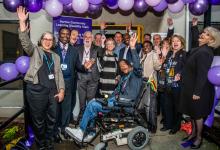A new integrated adult Community Learning Disability (LD) Team has been uniquely co-located with children’s social care and education services in purpose-designed premises to improve outcomes for residents of all ages with disabilities. The project has been jointly managed by the council, the clinical commissioning group (CCG) and the NHS provider trust in co-production with Harrow Mencap and Learning Disability self-advocates. An integrated pathway was developed for more flexible responses which should reduce the need for the more expensive long term health and care packages.
The challenge
Adults with learning disabilities have unique long term needs and often require support from both social care and health professionals. The desirability of integrated working has been well-documented nationally, for example in NHS England’s national plan and service model for learning disabled people of 2015. One challenge for Harrow Council was that adult social care was provided by generic teams. In September 2018, Harrow Council created a Specialist LD team for adults to supplement an existing Children and Young Adults with Disabilities team (CYAD) under the same Head of Service including the Transitions staff.
This laid the foundation for closer working with the local NHS Community LD Team, but staff, managers, carers and service users were aware that different offices, procedures and reporting lines still limited the opportunity for flexible holistic responses.
A multi-disciplinary approach could be especially useful for people with a learning disability facing a crisis. A 2018 Learning Disability briefing paper to the House of Commons set out issues such as premature mortality, ageing, employment, welfare benefits, criminal justice, advocacy and inappropriate hospital placements. An integrated service could lead to better outcomes for individuals and less pressure on long-term care costs. The total Harrow NHS and council expenditure on specialist learning disability provision was established as £29 million for a population of a quarter of a million.
The director of adult social services (DASS) set a challenge to work with the CCG and the NHS Trust to create a co-located team under a single operational management structure within a year.
This had been achieved in nearby London Boroughs with good results but early in the project an additional challenge became apparent – unique to Harrow: The NHS adults team works with over 18s, but on the council side 18-25-year -olds are supported through the Transitions team which was already part of CYAD who also needed to continue working closely with the Special Educational Needs teams within Education Services.
Ideally, therefore, not 45 but 110 staff needed to be co-located – along with appropriate governance for the multiple organisations involved and without an increase to existing budgets.
The solution
Effective governance was established initially through the health and wellbeing board (HWB) executive officers meeting with the CCG and then a tri-partite dedicated project board with the chair rotating between senior managers of the council, the CCG and the NHS Trust. The project also reported to the full HWB chaired by the Leader of the Council. This paid dividends when it was necessary to refurbish offices and establish capital funding which would be recouped through reductions in future rental costs.
A change management process to establish a shared culture of a common purpose in service of people with a learning disability was a key part of the project with two full day “Purpose Mapping” workshops for mixed staff groups in May 2019. A further session was held with all 45 staff from the joint LD teams closer to the December go-live date. This enabled all staff to get to know each other better, including understanding different professional roles and reviewing a new integrated care pathway. The new pathway was co-produced with service users and carers with input from Harrow Mencap.
Central and North West London NHS Foundation Trust (CNWL) and Harrow Council (LBH) have created the Community Learning Disability Team (CLDT) to deliver a multi-disciplinary approach to supporting learning disabled adults to live as well and as independently as possible, within the community, with improved life outcomes.
The team consists of a consultant psychiatrist, specialist registrar, nurses, psychologists, social workers, care managers, a behavioural therapist, a speech and language therapist, physiotherapist, sexual therapist, an occupational therapist, a receptionist, a medical secretary, administrator, business support and managers.
The new integrated adult’s team, alongside their colleagues in the CYAD and children’s educational services, are co-located in Harrow, with specially adapted premises to facilitate access and the provision of service. A new logo and large signage was designed.
Common purpose of the service
The primary purpose of the service is to support adults with a learning disability (and their families) to:
- maximise their physical and psychological wellbeing
- be empowered to enable them to reach their full potential and achieve a healthy independence (where appropriate from families and the care system) alongside their life aspirations.
The multidisciplinary team (MDT) meets weekly to discuss new allocations and complex cases to facilitate integrated working.
Locating education, health and social care professionals in the same office space, working together to support children, young people, and adults from birth onwards, and their families and carers, now provides a multifaceted yet seamless service. The right help will be provided at the right time and in the right place. The presence of education professionals will raise the profile of this aspect of the child or young person’s life, which will contribute to the whole person, whole family approach. The continued co-location of key services and the co-location now with health services further enables the collaborative approach to the development of EHC plans to age 25, and where there are specific challenges more efficient resolution. There will be more immediately accessible expertise as information is shared. The council’s SEND Strategy aims to ensure that more children and young people are supported at home and in local educational provision. This co-location of critical services supports that objective.
Sitting alongside education and health colleagues, social workers will be able to reinforce a social rights based perspective, ensuring that human rights are upheld, and there is a strong focus on the right to self- determination. They will bring social work values and ethics to the team, and their knowledge of the law. By ensuring that the individual is at the centre of the person centred planning, and by working in partnership with their families and carers, and with professional colleagues in the team, the social workers provide a comprehensive and holistic view of the individual’s needs and wishes. They are able to influence a strengths based approach to prevention, wellbeing and care planning, focusing on what matters to the individual and how their families and carers can be supported. The integrated approach enhances the social workers role in building resilience in people and in their communities, and so reduces support costs. This model will also reduce health inequalities for people with a learning disability due to the improvement in co-ordination and planning, and in targeted support.
As communication will be improved by the shared office space, there will be a platform for sharing professional concerns about individual circumstances. There will be more potential to share ideas and learning, pilot new ways of working, and so improve practice. The joint working across all ages, and the strengths based and whole family approach will reduce hand offs and duplication, increase transparency, and encourage interdisciplinary working with common goals.
I think what they are gonna do to get both services under one roof is good. They can all work together and support one another.’’
Brendan Chivasa, self-advocate
This is a positive step in the development of a more resilient and responsive approach to the delivery of services in Harrow to meet the increasing needs and aspirations of individuals and families"
Deven Pillay, Chief Executive, Harrow Mencap
An evaluation process has been designed to assess improved outcomes for service users and carers, any changes to activity levels and the medium to long term impact on support costs for both the CCG and the council. We will also monitor whether there are reduced hospital admissions.
Head of Service for the new Community LD Team, Seth Mills, is confident that an integrated team will enable a more responsive and flexible approach when individuals and their families are approaching a crisis and that this will lead to improved outcomes.
“Over the last few years, we have built up a strong culture of trust and professional relationships between the local agencies of the council, the CCG and the CNWL NHS Trust. The professional respect and collaborative working that we have for each other now enables us to keep the child firmly at the centre of all planning even where there are different professional views as to best interventions. We are able to maintain the correct balance between a medical and social model of care. We could not deliver the best outcomes for children, adolescents and adults in the borough without each other’s input. It is important that we know and demonstrate we all care about achieving the best for our children and young people.
While many frontline staff co-operated effectively in the past, we now also have clear support from the local health and care leadership.”
Joe Tobin, Children’s Commissioning & Transformation Manager at Harrow CCG and previously a social worker in Harrow
Over the last two years Harrow has been working on the implementation of the resilient communities’ agenda within the learning disability services. The wider vision is of a whole system approach to integrated care in order to improve the quality of Health and Social Care services for citizens, carers and families and is the key to Harrow’s vision and implementation. Harrow’s joint Learning Disability and Autism strategy underpins the changes made to the service design and creation of the Harrow Community Learning Disability team. By working together, with all partners including Harrow citizens, it has enabled us to be person centred, improve accessibility to services, pathways, outcomes and the wellbeing of Harrow citizens. Through co-production we have developed effective relationships with each other which have resulted in the implementation of best practice, being solution focused to improve services and communication.”
Transformation Project Manager Learning Disability and Autism at Harrow Council, Mital Vagdia
How is the new approach being sustained?
Long-serving staff remember when there used to be an integrated LD team some years ago and were pleased to be returning to that arrangement. For newer staff, the benefits of integration and co-location became clear to them in the culture change workshops. The culture of more integrated and holistic working will be reinforced through team managers and a review of the pathway after six months.
It is confidently expected that the natural advantages of co-location will lead to better outcomes, greater staff satisfaction and reduced long-term costs making the initiative self-sustaining. An evaluation model using data from all three parties has been designed to ensure that financial and non-financial benefits are achieved.
As Co-Chairs of the Leadership Team established under the Alliance Agreement between CNWL and LBH, we look forward to working with the combined NHS and social care team managers in the CLDT to continuously build on the advantages of co-location and integration for the benefit of local residents.”
Seth Mills, Head of Service, Children and Young Adults with Disabilities and Community Learning Disability Team, Harrow Council and Jo Carroll, Service Director for Learning Disability, CNWL NHS Trust
Lessons learned
Governance – ensuring buy-in from the senior managers in all three organisations and establishing strong governance at the outset was key, including the support of elected members.
Learning from peers in other local authorites and NHS Trusts – The Head of Service and project manager were inspired by and only able to fully scope the project following visits to other areas that were already working in an integrated fashion.
Staff engagement - As soon as the scope, timescales and objectives were agreed by management, all staff were actively engaged throughout the process through team meetings and a formal consultation as well as the change management workshops.
Financial flexibility and openness – It took time for all parties to share and agree total costs on LD across the borough (including continuing healthcare (CHC) and S117 funded), which then helped establish the financial significance of improvements. When there was a lucky opportunity to refurbish empty council offices and move staff out of expensive NHS premises, senior council management were flexible in funding that out of capital to be recouped over three years.
Strong project management and project support – Effective, experienced project management (part-time) was supplemented by rigorous project support (full-time) once the scope expanded to 110 staff. Attention to detail and engagement with the very many stakeholders such as IT, various building contractors, etc was essential while retaining sight of the medium term high level priorities for the project and its partners.
Engagement of the voluntary sector (specifically Harrow Mencap) and service users and carers / parents – The project reported to the Harrow LD Focus Group which brings together professionals, informal carers and the voluntary sector.
As carers, we are pleased to see that these vital services – Social Care and Community Health Care – are now merged 'under one roof’.
With effective management leadership, this should provide a work setting conducive to enhancing communication between the teams - creating more opportunities for sharing information, joint working, and discussing and implementing good practice.
We are hoping that this will result in positive benefits to all citizens with a learning disability living in Harrow – improved care with a more co-ordinated, holistic and person-centred approach to that care.
In addition, with the Education Services Teams , CYAD and Transition Specialist Learning Disability Teams being co-located to the same site, this will help to provide a more seamless service across all ages and a more accessible service overall."
Trisha Penfold, Co-chair; Olivia King-Boateng, Secretary of the Harrow Parents Forum; and Vicky Leech, Steering Group Chair of the Harrow Parents Forum (Carer Representatives on the Harrow Learning Disability Health and Social Care Focus Group).
Contact
Head of Service, Harrow Council
Seth Mills
[email protected]
Service Director for Learning Disability, CNWL NHS Trust
Jo Carroll
[email protected]
Project manager
Richard Pantlin
[email protected]
07958-293078



